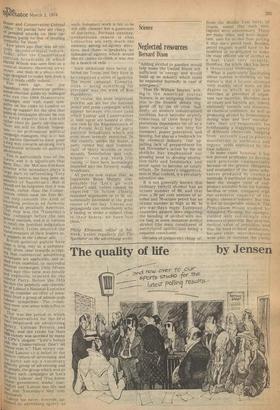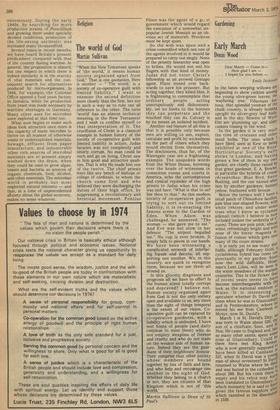Science
Neglected resources
Bernard Dixon
"Adding alcohol to gasoline would help make the United States selfsufficient in energy and would build up an industry which could be expanded hurriedly in case of emergency."
Thus Dr William Smyers, writing in the American journal Science, in an intriguing contribution to the frenetic debate triggered off by the oil crisis. Suddenly, all western industrialised societies have become acutely conscious of their heavy but precarious dependence on oil as a basic material — not only for transport, power generation, and heating, but also as a feedstock for the chemical industry. Our appalling lack of preparedness for last November's action by the oil sheikhs has emphasised our pressing need to develop alternative fuels and feedstocks, and never again to become so totally reliant. Dr Smyers's suggestion, seen in that context, is a peculiarly attractive one.
It is not generally known that ordinary (ethyl) alcohol has an octane number of 99, and that even a 50 per cent mixture of alcohol and 70-octane petrol has an octane number as high as 88. In pre-war days many European countries passed laws requiring the blending of alcohol with motor fuel, in some instances methyl alcohol (the main constituent of methylated spirits) also being a required constituent.
Decades of (relatively) cheap oil from the Middle East have, of course, meant that such stra tagems were unnecessary. There are many other, and more important, uses for alcohol than putting it into one's petrol tank. Besides, petrol engines would have to be modified or re-designed to make the most efficent use of alcohol as . a fuel. Until very recently, therefore, the whole idea has been a theoretical irrelevance.
What is particularly fascinating about current re-thinking on the matter is that it focuses attention very starkly once more on the degree to which we can use microbes as providers of important raw materials. Microbes such as yeasts and bacteria are, indeed, extremely versatile and economic as chemical craftsmen. As well as producing alcohol by fermentation during wine and beer manufacture, they are responsible for synthesising a staggering variety of different chemicals, ranging from solvents used in plastics manufacture to antibiotics and organic acids exploited by the food industry.
In many cases, however, it has not proved profitable to develop such processes commercially because of the greater cheapness and availability of the same substances produced by chemical methods. A particular problem has been the meagre yield of endproduct available from the humble bacillus or yeast, compared with the synthetic capacity of the *mighty chemical industry. But this is not an insuperable obstacle. The Penicillium mould studied by Alexander Fleming, for example, yielded only vanishingly tiny amounts of penicillin. But once the medical value of penicillin, and thus the need to boost production, became clear, microbiologists were able to increase the yields enormously. During the early 1940s. by searching for more productive strains of Penicillium and growing them under specially devised conditions, production of the life-saving antibiotic was increased many thousandfold.
Several times in recent months, we have heard Britain's present predicament compared with that of the country during wartime. In general, the proposition is absurd, but one respect in which there is indeed similarity is in the scarcity of vital materials and the consequent search for alternatives produced by micro-organisms. In 1944, for example, the Colonial Office opened a food yeast factory in Jamaica, while fat production from yeast was made necessary by wartime shortages in Germany. Many other uses for microbes were explored at that time too.
What now begins to make such ideas look attractive once more is the capacity of many microbes to thrive on all manner of otherwise waste or underexploited materials. Sewage, effluent from paper manufacture, and innumerable other rich sources of microbial nutrients are at present simply washed down the drain, when they could be used to grow algae, yeasts and bacteria as sources of organic chemicals, food, alcohol, and other essentials. The microbial world is probably Our most neglected natural resource — and that, at a time of unprecedented atixiety about the global economy, makes no sense whatever.

































 Previous page
Previous page